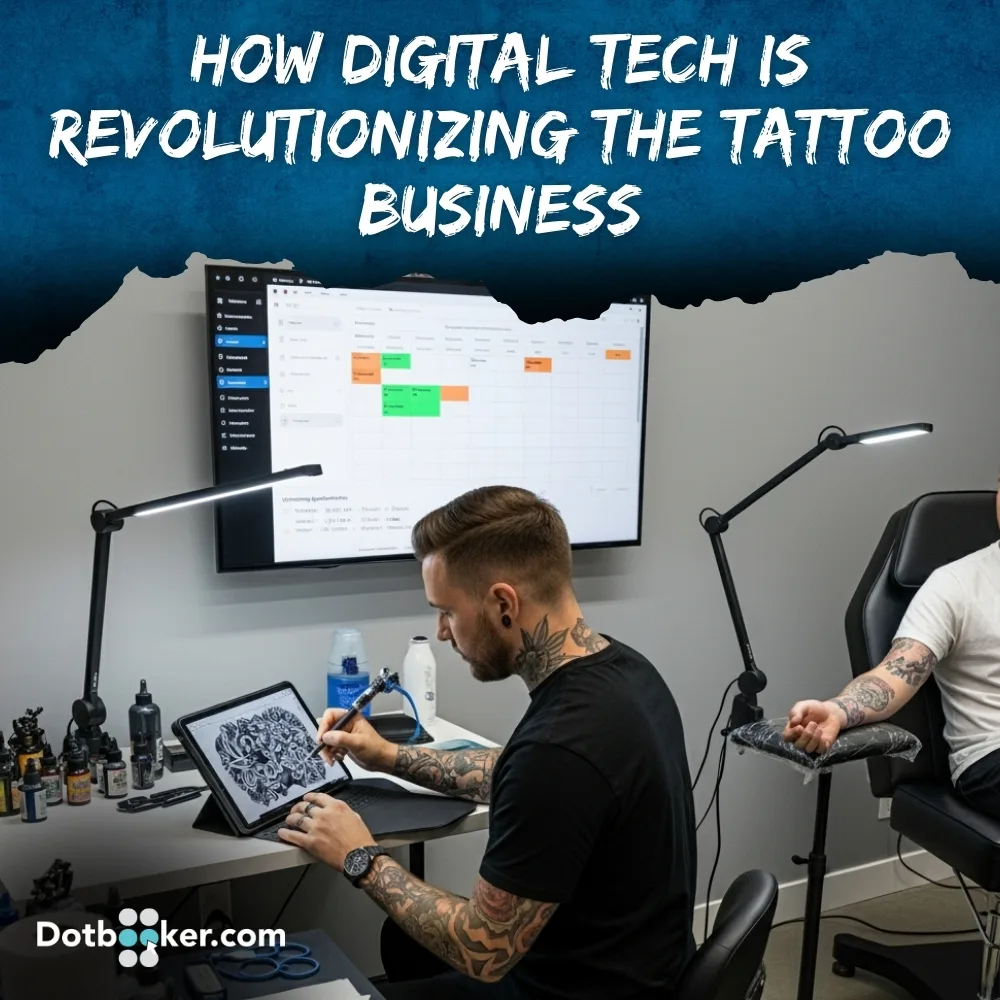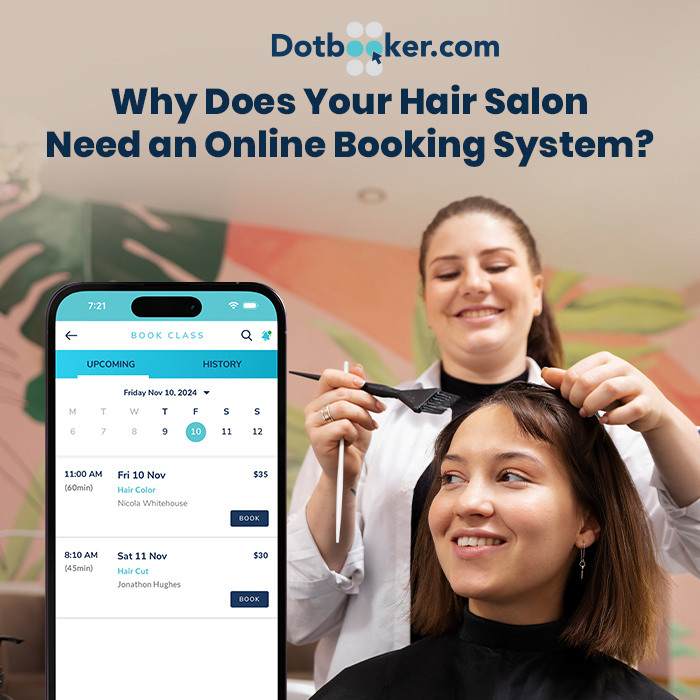
- By Dotbooker
- Oct 03, 2025
- 706
How Digital Tech Is Revolutionizing the Tattoo Business
Step into a tattoo studio today and you’ll notice more than buzzing machines and ink bottles. You’ll see tablets replacing appointment books, QR codes instead of cash drawers, and artists who can showcase their work to the world with just a click. What was once a business built on walk-ins and word-of-mouth has been transformed by technology into something more sophisticated, professional, and client-centered.
Tattooing will always be about the artistry. But how studios are managed, how clients connect, and how experiences are delivered are changing fast. Let’s explore how digital tech is quietly — yet powerfully — revolutionizing the tattoo business.
The Rise of Online Booking & Scheduling
The old way: clients had to call, leave a message, or wait in line to book a session. This resulted in lost opportunities for studios and prolonged waiting times for customers. Today, the rules are different.
With tattoo studio software, booking has gone digital:
- 24/7 access: clients can book appointments at midnight from their phone, without worrying about studio hours.
- Deposits upfront: clients can secure their slot instantly, which dramatically reduces last-minute cancellations.
- Automated reminders: email or text alerts remind clients days or hours before, minimizing no-shows.
For studios, this shift isn’t just convenient. It means more organized schedules, fewer wasted hours, and the ability to maximize productivity. For clients, it sends a clear message: your time matters, and so does your experience.
Imagine two studios side by side — one still using pen-and-paper scheduling, the other offering sleek online booking. Which one would a new client trust more? The answer is obvious.

Digital Portfolios & Virtual Showcases
A tattoo is forever, but the way clients explore designs has transformed. In the past, portfolios were thick binders stacked in studio corners. They worked, but they limited the artist’s reach.
Today, portfolios live online:
- Social platforms like Instagram and TikTok have become the new word-of-mouth, showcasing artistry to a global audience.
- Studio websites double as galleries, where clients can browse styles, compare artists, and even purchase gift cards.
- Virtual previews using AR/VR allow clients to “try on” tattoos digitally on their skin before committing — reducing hesitation and boosting confidence.
This digital-first presence doesn’t just attract clients. It elevates the entire brand of the studio. A well-maintained online portfolio signals professionalism, creativity, and trustworthiness — qualities that directly influence booking decisions.
Smart Payment Systems & E-Wallets
The tattoo industry used to run on cash. That limited flexibility, discouraged high-value bookings, and left studios with piles of untracked receipts. But modern clients expect — and technology delivers.
Software tattoo studio platforms now integrate:
- E-wallets and QR code scans for fast, secure payments.
- Contactless cards, which are especially popular with younger, tech-savvy customers.
- Subscription and membership models, where clients pay monthly for perks like discounted touch-ups or priority bookings.
This isn’t just about payment convenience. It’s about trust. A studio that offers modern payment methods signals that it respects client preferences and takes its business seriously. Meanwhile, digital records simplify accounting and allow owners to track revenue trends with precision.
AI & Design Tools in Tattoo Creation
Tattoo artistry is irreplaceable. No machine can replicate the imagination and skill of a human artist. But AI and digital tools are stepping in as collaborators, not competitors.
Here’s how they’re transforming design:
- Clients upload inspirations — a photo, a sketch, or even a phrase — and shortened tools generate multiple design options.
- Artists refine these concepts, combining efficiency with their unique creativity.
- The consultation process shortens, making the experience smoother for both sides.
This doesn’t dilute creativity; it enhances it. Clients walk in with clarity, artists spend numerous sketches, including, and everyone walks away with a design that feels tailor-made.
Inventory & Supply Management
Behind the scenes, the tattoo business runs on countless supplies: inks, needles, gloves, cleaning solutions, and more. Running out of just one can halt operations or — worse — compromise safety standards.
Digital inventory systems now take care of this with precision:
- Real-time tracking keeps tabs on every item.
- Automated alerts notify staff before stock runs low.
- Compliance logs ensure studios maintain health and safety regulations, a critical factor for long-term trust.
This quiet but crucial shift separates casual operations from professional studios. Clients may not see it directly, but they feel it in the reliability and safety of their experience.
Reputation & Review Management
In tattooing, reputation has always been king. But today, it lives online. A single five-star review can bring in dozens of new clients, while a negative one can have the opposite effect.
Technology helps studios take charge of their reputation:
- Platforms automatically request feedback after sessions.
- Owners can monitor and respond to reviews in real time.
- Digital Loyola Studio’s professionalism matches the artist’s craft, making it feel valued.
Reputation management is no longer left to chance — it’s powered by tools that ensure the artist’s craft is matched by a studio’s professionalism.
The Rise of Data-Driven Decisions
Tattooing is an art, but running a studio is a business. And like any business, decisions backed by data outperform decisions based on instinct alone.
With analytics embedded in tattoo studio software, owners can see:
- Peak booking helps them optimize staffing.
- Most in-demand styles, guiding marketing and pricing strategies.
- Revenue trends, enabling smarter financial planning.
It’s a simple shift with massive impact: studios no longer guess what works — they know.
Future Trends to Watch
The story doesn’t end here. Technological innovations to push the industry into uncharted territory:
- AR tools: digital projections on skin that can change with lighting or mood.
- NFT tattoo designs: offering clients exclusive ownership of digital artwork linked to blockchain.
- All-in-one studio software: integrating bookings, payments, marketing, compliance, and analytics into one seamless platform.
What feels futuristic today may well be the standard tomorrow — and studios that prepare now will lead the way.

Where Ink Meets Innovation
Tattooing is still about self-expression, culture, and identity. But in the modern era, the artistry is wrapped in layers of digital convenience, professionalism, and client-first experiences.
This is where solutions like Dotbooker shine. By connecting scheduling, payments, portfolios, and client communication in one place, Dotbooker helps tattoo studios not just keep up with change but thrive in it. Artists gain time to focus on their craft, while clients enjoy an experience that feels seamless from start to finish.
The ink may be permanent — but it’s the technology around it that makes the journey unforgettable.
Popular Blogs

- Oct 20, 2022
- 5071

- Sep 08, 2024
- 4467

- Nov 11, 2022
- 3866

- Sep 16, 2024
- 3154
Transform your business now!

Get an expert consultation for your business's streamlined operations.